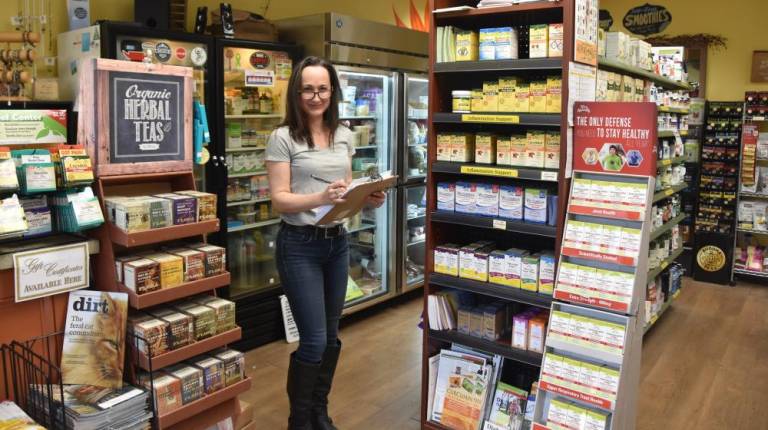In the time of COVID-19, flowers replace hugs, cans still need to be recycled, practically everyone is bike riding and it’s nice to feel human while you shop.
There isn’t a single local business that hasn’t been affected by the coronavirus one way or another. Those that are able to stay open are getting crafty–and working harder than ever to fulfill orders while meeting safety and social distancing guidelines.
Shopping like a human
When you step into Down 2 Earth, a gluten-free health food store between Dunkin Donuts and Pizza Express in Florida, NY, and owner Lisa Mitchell greets you with a phone cradled between her neck and shoulder, it’s almost possible to forget for a moment that the world outside has changed drastically.
Regulars might notice one big change: There’s nobody back in the kitchen. Her three employees were uncomfortable continuing to work, so Mitchell is back to doing what she did when she started her store seven years ago: working open to close six days a week. That means getting there early to make prepackaged lunches, stocking shelves, popping into the kitchen to whip up a juice, doing all the baking, cleaning, inventory, ordering, bookkeeping and promotion and administrative stuff, and what she’s best known for: the thoughtful consulting, as she’s ringing up customers, about whatever ails them.
“I had to sort of reignite that fire, I was like alright, I need to be 100 percent on point and keep my wits about me and try to be every person. But yeah, it’s a little lonely,” she said. “I might talk to myself while I’m pricing.”
The ordering has been a juggling act, with people stopping in for vitamin C and zinc and colloidal silver, local eggs and organic produce; and increasingly for everyday things like toothpaste and shampoo, and – newly – hair dye (which Mitchell doesn’t carry but will special order). The couple weeks when everyone was in a stocking-up frenzy, “It required scavenger hunts to try to find decent manufacturers that still had these things in stock, to keep things on the shelves when everyone’s running out of everything,” she said.
Other than bolstering her immune support and hand sanitizer offerings, and struggling to keep churning out fresh baked goods, the shelves look much the way they always have. “We’ve been offering the same thing,” said Mitchell. “We’ve been trying to maintain that normalcy.”
For businesses everywhere, maintaining a semblance of normalcy right now requires untold effort behind the scenes. Mitchell spent a few nights at her store until 9 or 10 p.m. at the end of March, applying for the payroll protection program that would let her keep paying her employees (her kitchen manager has come in a couple times off-hours to do things like baking). One night, after closing, Mitchell took a break from digging through her file cabinets for the numbers the forms required. “I called next door to Frank’s to see if they were still open,” she recalls laughingly. “I had to stand in the doorway and ask what type of Argentina Malbecs they had. I sat here with wine in my coffee mug, just to make this a little less miserable.”
Mitchell was allowed, but not required, to be open, and she toyed with the idea of taking this strange period as a one-time chance to spend more time with her two high-school-aged boys. Crunching the numbers, Mitchell thought she might be able to survive being closed for a month. “It was tempting initially,” she said. But that question answered itself. “It was one of those two in the morning, staring at the ceiling type things,” she said. “It was like, you know what? No, I need to be here. Part of the reason I built the store was I wanted to build sort of a little oasis, from all the unhealthy choices out there, and make it a place people feel comfortable coming in to and talking to us. I didn’t want to compromise that. I wanted to maintain a little bit of an oasis, where people can come in and feel a little bit normal. And feel like okay, it’s still a place where I can get some of the things that I need on a smaller scale and not feel afraid.”
She’s taking measures to avoid draining herself – psychologically, spiritually, adrenally – by closing at 3 or 4 p.m. instead of 5 or 7 p.m., and driving the two minutes from her house to meet customers by appointment if they can’t make it during those hours. She’s been shipping a box a week to a couple of teacher customers who aren’t driving by anymore because schools are closed.
With schools closed for the rest of the school year, the art of finding that work-life balance is a moving target for everyone. “I’m still trying to spend more time with my kids and help them with their schoolwork and try to be a mom in the middle of all this,” said Mitchell. The previous Saturday, “I was supposed to close at 3 and I was stuck here ‘til 5:30. People were still coming in, the phone was ringing off the hook. It was kind of backwards,” because the rest of the day had been slow, said Mitchell. Heck, the rest of the month had been slow; the store is running on about half of normal sales. “It’s just the luck of the draw in retail, you don’t know when everyone’s going to show up.”
There are silver linings to wearing every hat in the place. “I like to use my creative brain, and I’ve obviously had to re-ignite that in the last few weeks. It’s been fun, you know?,” said Mitchell. “I’ve made some new lunch item recipes, I made a new soup. It’s the world I had to step out of in order to take care of everything else, and I left that to the ladies.” Getting back into the kitchen, “even though it’s tiring and it’s messy and it keeps me here stuck later, I do enjoy it. The fact that I have a living element to the store; it’s not just dusty things sitting on shelves. The fact that I’m able to prepare things that help people eat healthy food, and not just pizza all day long,” she laughs.
A customer who’d just walked out had said, “‘I like coming in here, because I can just come in and talk to you,’” Mitchell related. “You know, we keep our six-foot distance and whatever, but she can come in and do her thing, grab a couple things and actually feel human, a little bit social,” she said. “I guess that’s kind of what’s propelled me to be here while my kids are home.”

